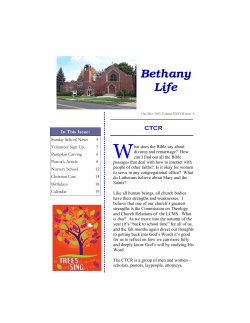
Gratitude: Insights from the Science of Well-Being Robert A. Emmons
Gratitude: Insights from the Science of Well-Being Robert A. Emmons June 9th, 2010 Contact: raemmons@ucdavis.edu How to get rich quick… “I cannot tell you anything that, in a few minutes, will tell you how to be rich. But I can tell you how to feel rich, which is far better, let me tell you firsthand, than being rich. Be grateful…It's the only totally reliable getrich-quick scheme.” --Ben Stein, lawyer, writer, actor and economist Gratitude has the power to heal, to energize, and to transform lives. Gratitude: Affirming goodness and recognizing that the sources of this goodness are outside the self Recognitions of Gratitude Recognize the gift Recognize the goodness of the gift Recognize the goodness of the giver Recognize the gratuitous nature of the gift The Dual Nature of Gratitude • • 1. 2. 3. Worldly, common, transactional Spiritual, ethereal, transcendent What is gratitude? What we know about gratitude Why gratitude matters Targets of Gratitude 1. 2. 3. 4. Other people God Animals Nature Additional Meanings: Cosmic/religious gratitude • “Vast thankfulness” that cannot be expressed to any human being • Religious naturalism: Awe, wonder, reverence, gratitude “We are moved to awe and wonder at the grandeur…the richness of natural beauty; it fills us with joy and thanksgiving (Goodenough, The Sacred Depths of Nature) Quotes about Gratitude • “Gratitude is the moral memory of mankind” • “Gratitude is not only the greatest of the virtues, it is the parent of all the others” • "Nothing is more honorable than a grateful heart." “Ingratitude…is the essence of vileness” Let us rise up and be thankful, for if we didn’t learn a lot today, at least we learned a little, and if we didn’t learn a little, at least we didn’t get sick, and if we got sick, at least we didn’t die; so, let us all be thankful --The Buddha John Wesley (1703-1791) • “True religion is right tempers towards God and man. It is, in two words, gratitude and benevolence; gratitude to our Creator and supreme Benefactor, and benevolence to our fellow creatures” Two main questions: 1. Can gratitude be cultivated on a regular basis? How? 2. If so, what are the effects of gratitude on human health, happiness and well-being? Why happiness matters: Happy people are more successful in life 1. Health and well-being 2. Career success and income levels 3. Relationship duration and satisfaction Happiness makes good things happen: • higher income and superior work outcomes (e.g., greater productivity, higher quality of work, greater occupational attainment) • larger social rewards (more satisfying and longer marriages, more friends, stronger social support, and richer social interactions) • more activity and energy, better physical health (e.g., a bolstered immune system, lowered stress levels, less pain) and even longer life What Determines Happiness? Circumstances 10% Intentional Activity 40% Set Point 50% Gratitude: The Key to Life? “Whatever you are in search of—peace of mind, prosperity, health, love—it is waiting for you if only you are willing to receive it with an open and grateful heart.” G. K. Chesterton on Gratitude “gratitude produced the most purely joyful moments that have been known to man” “All goods look better when they look like gifts” You say grace before meals. All right. But I say grace before the concert and the opera, and grace before the play and pantomime, and grace before I open a book, and grace before sketching, painting, and swimming, fencing, boxing, walking, playing, dancing, and grace before I dip the pen in ink. — G. K. Chesterton Counting Blessings or Burdens? Random assignment, placebo controlled experimental trials Examples of Hassles Hard to find parking Messy kitchen no one will clean Finances depleting quickly No money for gas Our house smells like manure Burned my macaroni and cheese Doing favor for friend who didn’t appreciate it Examples of ‘‘Blessings” Generosity of friends The right to vote Saw grandson get first haircut That I have learned all that I have learned Sunset through the clouds The chance to be alive That my in-laws live only 10 mins. away Research on the Benefits of Gratefulness: Experimental Findings • Psychological (Positive emotions: alert, energetic, enthused, attentive) • Physical (more exercise, better sleep, fewer symptoms) • Interpersonal (more helpful and connected, less lonely and isolated) Source: R.A. Emmons & M.E. McCullough, Journal of Personality and Social Psychology, 2003, 84, 377-389. 140 persons with neuromuscular disease Randomly assigned to one of two groups: Gratitude listing or to a Control group Outcomes: Emotional, physical, and social well-being, 3-week time frame Peripheral disorders of the nervous system affecting anterior horn cells, peripheral nerves, neuromuscular junction, and muscle > 300 Diseases (over 248 distinct genes) Overall prevalence > 4 million in U.S. Significantly higher levels of positive emotions in the gratitude condition No differences in negative emotions Significant effects for life appraisal items (life as whole, upcoming day, connected to others) More hours of sleep (7.58 vs. 7.05), no effect for exercise or pain Dependent Variable Gratitude Control F(1,54) Positive affect 3.69 3.31 3.60* Negative affect 1.76 1.86 ns Life satisfaction 4.42 3.63 5.97** Life as a whole 5.54 4.91 6.46** Connectedness 5.77 5.17 4.77** Does counting blessings impact children’s wellbeing? Gratitude intervention with 6th and 7th graders The gratitude induction was related to optimism, overall life satisfaction, and domain-specific life satisfaction (e.g., school experience, residency) The gratitude group reported greater satisfaction with their school experience at both the immediate post-test and 3-week follow-up Journal of School Psychology, 2008 1. 2. 3. 4. 5. Gratitude allows celebration of the present Gratitude blocks toxic emotions Grateful people are more stress-resilient Gratitude strengthens social ties and self-worth Gratitude brings health benefits Gratitude Amplifies the Good Gratitude is important in the prevention of depression Grateful people show a positive memory bias Gratitude enhances the retrievability of positive experiences (Watkins et al., 2003) Grateful people are less isolated
© Copyright 2025
















